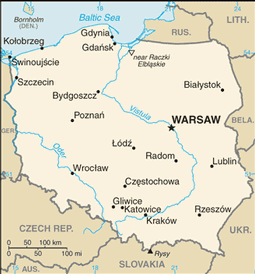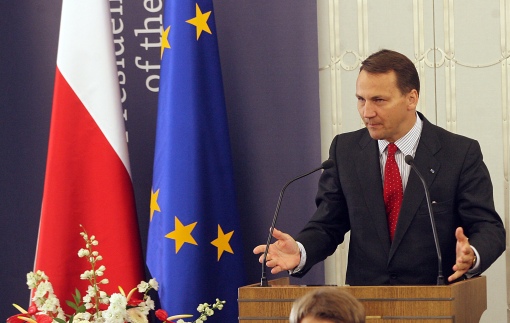
The article titled The European Union Crisis: The View from Poland was posted on The Foreign Policy Association. Artur Kluz co-authored the article. The link to the article is here.
The European Union is walking a thin line. Bloomberg News recently reported that European CEOs are actively considering the worst case scenario – namely, the end of the Euro. Spanish and Italian companies are increasingly moving funds to Germany in expectation of one or more Eurozone countries exiting the Eurozone. Germany’s Central Bank recorded capital inflows of $15 billion from non-banks in September 2011. Confidence in the Euro seems to be sliding.

CIA World Factbook
Nevertheless, Poland is finding its own path through the EU crisis. It is one of the few EU countries that did not suffer from the financial crisis. It is the only of 27 EU nations to avoid a recession in 2009. Poland’s financial system is stable and the stock exchange is one of the healthiest in the EU.
Polish exports grew more than 3.5-fold from 2000 to 2010 and Polish companies are the low-cost suppliers for many of Germany’s export companies. Poland is Germany’s largest trading partner. For Germany, trade with Poland exceeds trade with Russia, Spain, or Japan, and German exports across the Polish border have doubled since Warsaw joined the EU in 2004. The Ernst & Young Report ranks Poland number sevenon its list of attractive global investment locations. And Poland’s co-hosting the European Soccer Championships this summer will surely enhance this global reputation and increase capital infusion infrastructure projects, and travel related industries will continue to attract capital.
Poland is one of the few European nations with substantial domestic energy production. It sits on shale gas reserves, which the Energy Information Administration (EIA) estimates is 187 trillion cubic feet (approximately 5,3 trillion cubic meters) – more than 200 times annual consumption, which could last for over two centuries.
Why Poland Remains Vibrant
Poland’s 39 million citizens provide for robust domestic demand of goods and services. The Polish Zloty has insulated the economy from Euro woes and kept Polish exports competitive. Warsaw’s banking regulations prevent foreign banks from taking capital out of its Polish subsidiaries to cover losses elsewhere, resulting in relative calm in Poland’s credit markets. Finally, the Polish workforce is young and educated, and those who emigrated following Poland’s EU accession have returned home to a country that provides them with better opportunities.
Government action has also supported Poland’s macro economy. Prime Minister Donald Tusk vowed to raise the retirement age and slash tax and pension privileges that helped reduce public debt and shield the EU’s largest Central European economy from the Euro crisis.
Any change to the EU’s governing treaties aimed at enhancing the fiscal integration will likely face hurdles in Poland. Notwithstanding its impressive win in the national elections last fall, the ruling coalition lacks the required two-thirds majority needed to ratify international agreements in the Polish Parliament, Sejm. And the leader of the conservative Law and Justice party Jaroslaw Kaczynski already opined that a treaty change would mean giving up Poland’s national sovereignty – a situation many, if not most Poles would refuse to accept. Another conservative leader in the Sejm, Zbigniew Ziobro, said he could not support a treaty that would result in ceding control over the national budget to Brussels.
Poland’s Role Today
Poland is at a historical crossroads. Already a leader of the new Central European democracies, it has little to no influence on Europe’s foreign and security policy. Notwithstanding its economic buoyancy, Poland’s impact on the world stage is rather minimal. But through this crisis, one can see opportunities for Poland to play a leading role in the shaping of new EU internal policies, propelling this Central European nation to the status of an indispensable power broker state.

Polish Foreign Minister Radoslaw Sikorski. PAP/Paweł Kula
A more active Polish political approach in the EU is already bearing fruits. Last year, Polish Foreign Minister Radoslaw Sikorski’s vociferous speech, in which he described the possible disintegration of the Eurozone as Poland’s biggest threat, has led German Chancellor Merkel and French President Sarkozy to invite their Polish and Swedish counterparts to take part in voluntary discussions that seek to deepen financial integration and oversight in the EU club.
Behind the scenes however, the Euro looks as if it is set for tougher days. In the coming weeks, Poles and other Central Europeans will be asked to contribute to an emergency fund to rescue severely indebted EU states. Czech and Slovak leaders have already spoken out against the plan, and for Lithuania, a post-Soviet EU member that is still reeling from a devastating economic downturn, bailing out the Eurozone is simply unimaginable. Other relatively new EU members as Hungary and Romania cannot contribute to a Euro bailout fund until they finish paying for IMF loans that helped each stave off their own financial despair.
Unlike other Central and Eastern EU members, Poland has a choice. Warsaw’s public debt is considerably lower than that of other nations in the region and is nowhere close to bankrupt Eurozone members such as Greece and Italy. Premier Tusk believes Poland should inject itself in the process of salvaging the Euro as a way of gaining influence in current and future EU decision-making. Polish Central Bank and many Warsaw business leaders would support this view in the hope that one day Poland will adopt the Euro. They argue that the survival of the Euro is critical to Poland’s ongoing modernization and financial growth.
But opposing arguments are equally simple and possibly more convincing: why should Poles give their hard earned money to financially reckless and overly generous social welfare states such as Greece, Spain or Italy? Why shouldn’t Poland have a say in how these emergency relief funds are distributed?
The more time passes and the more political idling continues, Poles will find themselves square in the camp of the likes of Tory leader and British Prime Minister David Cameron and other conservatives who oppose a new EU treaty. Whatever happens in the coming months, this much is certain: for Poland, continued EU turmoil presents an opportunity filled with both risks and rewards.
Artur Kluz is an attorney, founder of The Hephaistone Group and partner at Metropolitan Capital Solutions. He has over a decade of experience in international investments, corporate governance and private equity while working and advising on projects in the US, Europe, the Middle East, and Southeast Asia.
Guy Billauer is a New York based attorney specializing in corporate and international law, who spent over a decade in Washington DC focusing on Central and Eastern Europe- American relations as part of his responsibilities at the AJC, a global advocacy organization.